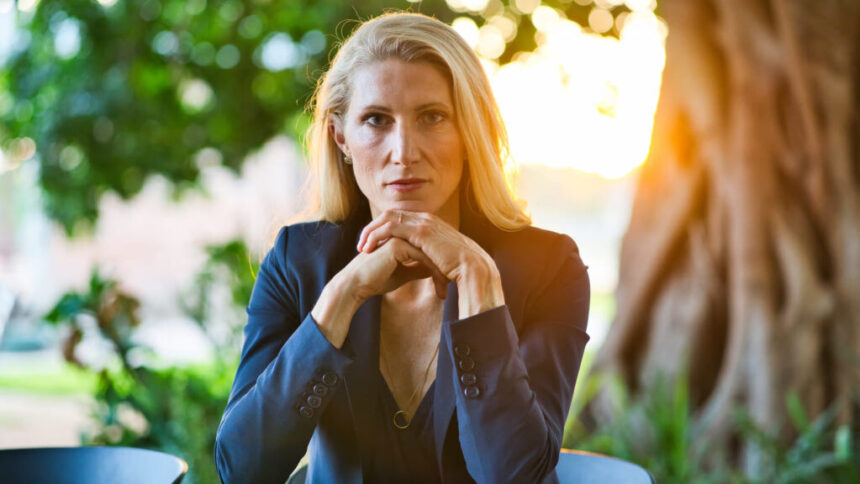, as well as crop failures and malnutrition that are putting people at risk. Climate change is a security issue because it’s driving conflict and displacement, as we see in places like Syria, Afghanistan, and Yemen, and we know that that is just the beginning.
It’s a security issue because it’s changing our ability to have a stable economy and to have personal and community safety. If you can’t have safety in your home, if you can’t have food on your table, if you can’t have a stable income, you’re vulnerable to disease, to conflict, to displacement, to death. And all of that is driving by climate change and the impact on our health.
And it’s a security issue because we are required to act. It’s not just about the right thing to do — it’s about the necessary thing to do, and if we don’t, we’re going to see an increasing number of deaths, of disease, of conflict, of displacement. It’s a security issue because it’s about our security as a planet, as a people, and as individuals.
Given that, why has it been so challenging to advance climate change mitigation and adaptation efforts, particularly in the current political landscape?
I think it’s really difficult because it’s an issue that requires us to think about our future, and the future of our children, and the future of our grandchildren, and the future of people who don’t look like us, who don’t live where we live. It’s not an easy thing to do, to ask people to sacrifice now for the good of others. And it’s not something that we’re really good at, as a species.
It’s politically challenging because it’s not an immediate threat. It’s hard to see the connecting dots between burning fossil fuels and the rising temperatures and the impact on our health. It’s hard to see that the things that we do in our daily life, the choices that we make, are contributing to the problem. And it’s hard to see that the solutions are available, but require investment, and that investment is not just in climate-friendly technologies, but in health systems, in infrastructure, in education, in justice.
It’s hard to make those choices. It’s hard to convince people that it’s necessary. And it’s hard to make people believe that we can actually do it.
What do you think needs to change in order for us to address the climate crisis with the urgency it demands?
We need to think about what we’re willing to do now to ensure our future. We need to think about what we’re willing to give up, and what we’re willing to invest in. We need to think about how we can build a future that is more resilient, more equitable, more healthy, more just.
We need to make sure that our leaders understand that this is not a political issue, it’s a human issue. It’s not about ideology, it’s about survival. It’s not about left or right, it’s about right or wrong. And it’s not about winning an election, it’s about winning the future.
And we need to make sure that we all understand that this is our responsibility, our opportunity, and our legacy. We can do this, but we have to do it now. We have to do it together. And we have to do it for each other.
What are some steps that individuals can take to address climate change and its impact on health?
There are so many things that individuals can do. They can reduce their carbon footprint by driving less, flying less, eating less meat, using less energy. They can support renewable energy, support climate-friendly policies, support companies that are doing the right thing. They can speak up, vote, protest, educate others, inspire others. They can volunteer, donate, mentor, advocate. They can be the change that we need to see.
But most importantly, they can care. They can care about the world, about the people in it, about the future. They can care enough to act, to act now, to act together. They can care enough to make a difference, to make a change, to make a better world for all of us.
This led to the shutdown of this facility, causing a shortage of IV fluids across the country. This is a real impact of extreme weather events that directly affects our healthcare system and our ability to provide care to patients.
Therefore, it is crucial that we start taking action now to make our healthcare systems more resilient to climate change. One key intervention is investing in our healthcare workforce. By ensuring that we have a skilled and well-trained workforce capable of delivering high-quality care, we can not only close existing equity and care gaps but also provide better services and focus on prevention rather than just treating diseases.
Furthermore, building resilience to pandemics and other health crises requires a strong and prepared health workforce. The healthcare workers are the ones on the front lines, managing and treating patients in times of crisis. Investing in the workforce means investing in our ability to respond to and manage these situations effectively.
In addition to investing in our healthcare workforce, we also need to focus on building infrastructure that is resilient to extreme weather events. Hospitals and healthcare facilities need to be prepared for hurricanes, floods, and other natural disasters that can disrupt their operations. This includes building flood walls, securing facilities, and ensuring that essential services can continue even in the face of extreme weather.
Ultimately, climate change is not a hoax. It is a real and pressing issue that is already impacting our health, our healthcare systems, and our communities. By addressing the effects of extreme weather events and taking proactive measures to build resilience, we can better prepare ourselves for the challenges that climate change will bring. It is time to prioritize climate change and take action to protect our health and well-being for the future. Taking down a single facility had disruptions in health services across the country where elective cases were delayed, services were being disrupted.
The closure of a single health facility can have far-reaching consequences on the health services of an entire country. When elective cases are delayed and services are disrupted, it can have a ripple effect on the well-being of the population. The importance of protecting our health and ensuring resilience in times of crisis cannot be overstated.
The impact of such disruptions goes beyond just the immediate inconvenience for patients. It can lead to a backlog of cases, increased wait times for essential treatments, and a strain on the healthcare system as a whole. Patients who rely on these services for their well-being may be left without access to the care they need, leading to further health complications down the line.
In addition to the direct impact on patients, there are also economic and security implications of disruptions in health services. A healthy population is crucial for a thriving economy, and any obstacles to accessing healthcare can hinder productivity and overall well-being. Furthermore, ensuring the availability of essential health services is vital for national security, as a healthy population is better equipped to handle any challenges that may arise.
Investing in the resilience of our healthcare system is not just a matter of public health, but also a strategic decision with long-term benefits. By ensuring that our health services are robust and able to withstand disruptions, we can protect the well-being of our population, support economic growth, and enhance national security.
In conclusion, the closure of a single health facility can have widespread implications for the health services of a country. It is essential to prioritize investments in the resilience of our healthcare system to ensure that disruptions are minimized, and the well-being of the population is protected. By recognizing the importance of health security and making strategic investments, we can build a stronger, more resilient healthcare system for the future.







